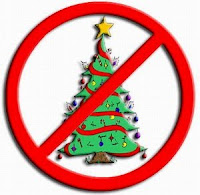
...in the sixteenth and seventeenth centuries:
It may seem like Christmas has always been celebrated in the United States, but that's not the case. In fact, the joyous religious holiday was actually banned in America for several decades – by Christians themselves.
The original war on Christmas was waged during the sixteenth and seventeenth century by Puritans, or Protestant Christians who believed that people needed strict rules to be religious and that any kind of merrymaking was sinful.
"Shocking as it sounds, followers of Jesus Christ in both America and England helped pass laws making it illegal to observe Christmas, believing it was an insult to God to honor a day associated with ancient paganism," according to "Shocked by the Bible" (Thomas Nelson Inc, 2008). "Most Americans today are unaware that Christmas was banned in Boston from 1659 to 1681."
All Christmas activities, including dancing, seasonal plays, games, singing carols, cheerful celebration - and especially drinking - were banned by the Puritan-dominated Parliament of England in 1644, with the Puritans of New England following suit. Christmas was outlawed in Boston, and the Plymouth colony made celebrating Christmas a criminal offense, according to "Once Upon a Gospel" (Twenty-Third Publications, 2008).
Christmas trees and decorations were considered to be unholy pagan rituals, and the Puritans also banned traditional Christmas foods such as mince pies and pudding. Puritan laws required that stores and businesses remain open all day on Christmas, and town criers walked through the streets on Christmas Eve calling out "No Christmas, no Christmas!"
In England, the ban on the holiday was lifted in 1660, when Charles II took over the throne. However, the Puritan presence remained in New England and Christmas did not become a legal holiday there until 1856. Even then, some schools continued to hold classes on December 25 until 1870.
Although the change was gradual, people began to once again embrace the holiday until Christmas as we know it today – complete with mistletoe, eggnog and candy canes – was celebrated throughout the American colonies.
___
Post by Remy Melina, Life's Little Mysteries, Staff Writer
1 comment:
Did you know that England’s outlawing of Christmas in 1644 by the Puritan Parliament was a deal struck with the Scottish Presbyterians in order to gain their support in the English Civil War? These Scottish Christians had already placed their ban on Christmas at the height of the Reformation in 1583. Incredibly, this Yuletide ban in Scotland lasted almost 400 years (until the 1950s), which also corresponds to Presbyterians in the American South.
This Scottish ban on Christmas actually began in Geneva, Switzerland and then migrated to Scotland with the spread of Calvinist theological views. The Calvinist ban on Christmas started with a couple of successors of the Reformation – John Calvin and John Knox. When these devote men tried to fully enact Luther’s sola scriptura concept (a Christian is to be guided by Scripture alone), they banned all Roman holidays, which included Christmas.
As you can imagine, a ban of Christmas caused uproar in certain quarters and John Calvin was reproached as the instigator of the action. Calvin wrote a correspondence that if he had been asked for advice, he would have not supported this decision. John Calvin was initially uneasy about the edict to ban Roman festivals, because he feared that this sudden change might provoke tumult, which could impede the course of the Reformation (even though Calvin’s view on worship was clearly stated and called the regulative principle of worship – all modes of worship must be expressly sanctioned by God’s Word).
Then we have John Knox and the Scottish Reformation, who repeatedly affirmed that true worship must be instituted by God – in His Word. In 1566, the General Assembly in Scotland articulated the position of the Scottish Church: “concerning the festivals of our Lord’s nativity, circumcision, … these festivals at the present time obtain no place among us; for we dare not religiously celebrate any other festival day that what the divine oracles prescribed.”
So in this account, we can say that the War on Christmas traces back to the height of the Reformation (1583), but in actuality, the War over the Nativity goes back even further to some of the Early Church Fathers in the third and fourth centuries – like Tertuillan – before the Birth of the Unconquered Sun became officially assimilated into the Christian Church in AD 379. BTW – The Catholic Encyclopedia admits that the Nativity of the Unconquered Sun, celebrated on the ancient winter solstice December 25th, has a strong claim on the responsibility of our December date, and the first recorded evidence of a Christianized birth celebration was at the time when Emperor Constantine was politically and religiously consolidating his Roman Empire in 336 AD. I say the Christianized birth celebration, because the phrase “Christ’s mass” (Christmas) didn’t exist in the 4th century. “Christmas” was first found about 1000 years ago (Catholic Encyclopedia says 1038 AD).
I could go on and on about the Christian history of Christmas that too many people don’t know exists. I am a devote Christian myself who has researched Christmas for over 10 years in a quest to answer so many things about Christmas that just doesn’t add up for those desirous of being part of Christ’s pure and spotless Bride. My research culminated in a book entitled “SANTA-TIZING: What’s wrong with Christmas and how to clean it up,” which is available at amazon.com or B&N.com or my own website www.santa-tizing.com, if you’re interested.
Thank you for your time & God Bless!
Post a Comment